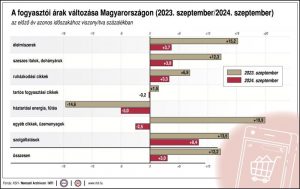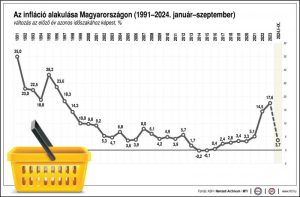
Core inflation is expected to decline in the latter half of 2025.Continue reading

In September, consumer prices were on average 3.0% higher than a year earlier, while they fell by 0.1% on average over one month, including a 3.7% fall in the price of fuel compared to August, the Hungarian Central Statistical Office (KSH) reported on Thursday.
Citing the latest data from the KSH, the Ministry for National Economy said that inflation fell further to 3% in September, following 3.4% in August. This brought inflation to a new low on an annual basis.
In September, inflation was held back significantly by fuel prices, which improved by 9.5% on an annual basis and by 3.7% on a monthly basis.
Food prices rose by 3.7% over 12 months, including flour by 32.9%, milk by 13.8%, chocolate and cocoa by 10.1%, fruit and vegetable juice by 8.5%, restaurant meals by 7.6%, school meals by 6.9%, and edible oil by 6.7%. Within this product group, dry pasta fell by 5.8%, sugar by 3.6%, eggs by 3.5%, poultry by 2.4%, and dairy by 1.0% compared to September last year.

Change in consumer prices compared with the same period of the previous year (September 2023/September 2024), in percentage: food; spirits, tobacco; clothing; consumer durables; household energy; other articles, fuels; services; total. Source: MTI
According to the latest data from the KSH, services increased by 8.4% over a year, including rent 10.7%, motorway tolls, car rental, parking 10.6%, condominium common charges 10.5%, personal care services 10.0%, vehicle repair and maintenance 9.9%, home repair and maintenance 8.6%, sports and museum tickets 8.1%, and holiday services 3.8%.
Compared to August, consumer prices fell by 0.1% on average.
Food prices increased by an average of 1.0%, including milk by 6.9%, butter by 5.0%, dairy products by 3.2%, seasonal food (potatoes, fresh vegetables, fruit) by 2.9%, eggs by 2.7%, sugar by 1.5%, poultry meat by 1.1%, and pork by 0.6%.

Inflation in Hungary (1991 – January-September 2024). Change in consumer prices compared to the same period of the previous year, in percentage. Source: MTI
In order to keep inflation low, the government will continue to maintain targeted and effective measures such as the online price monitoring system, the ministry’s statement quoted Márton Nagy, Minister for National Economy, as saying. The moderation in inflation and the continued strong real wage growth, which has been sustained for a year now, will allow retail sales to continue to expand, the statement said. The Minister stressed that persistently low inflation provides predictability, which boosts consumer confidence and supports economic growth through increased consumption.
Via MTI, Featured image: Pexels